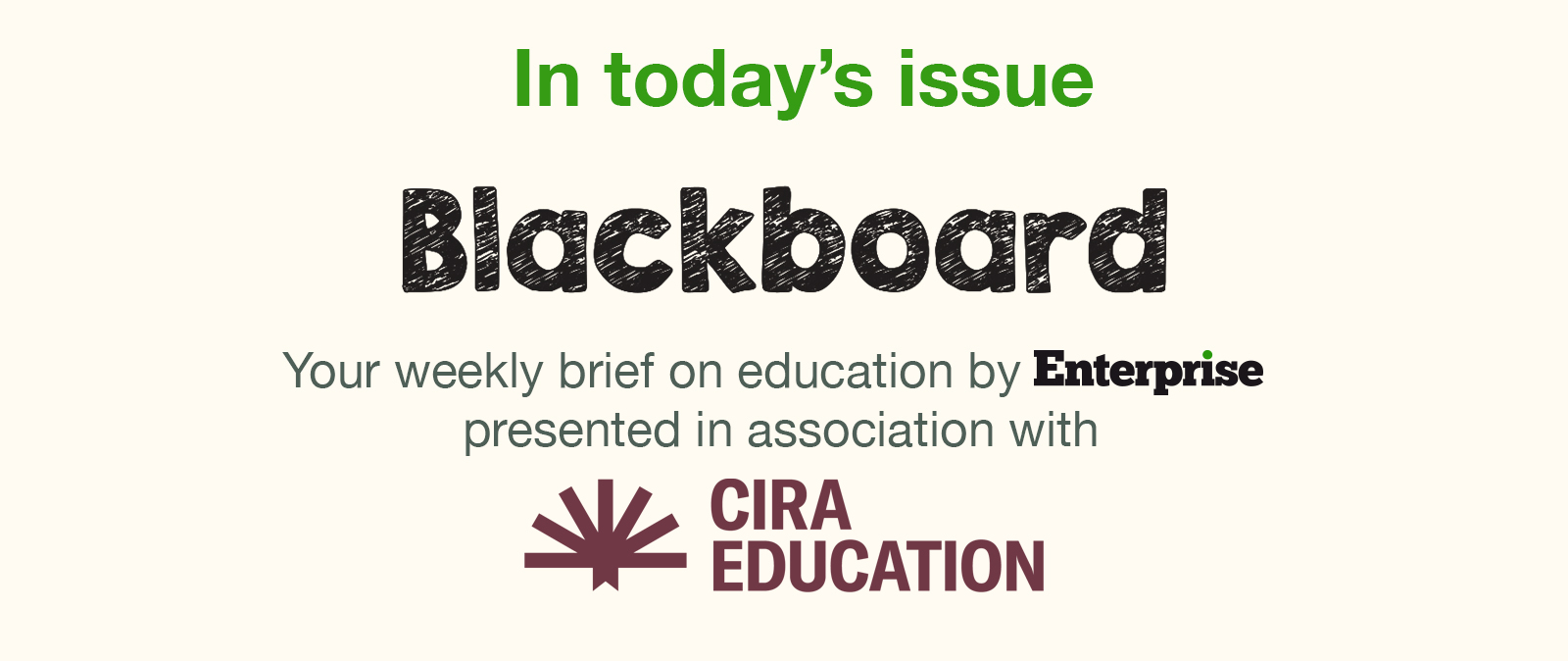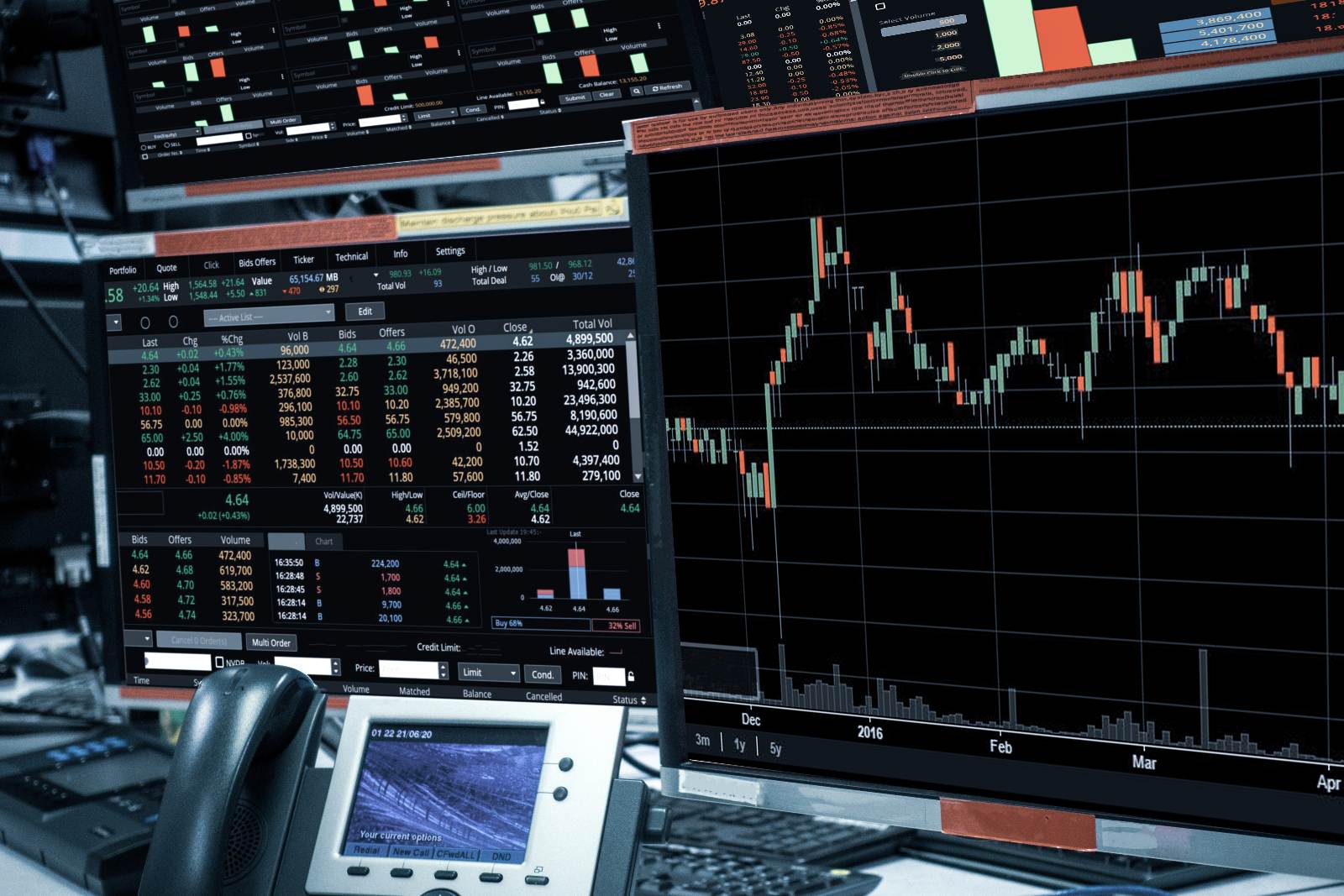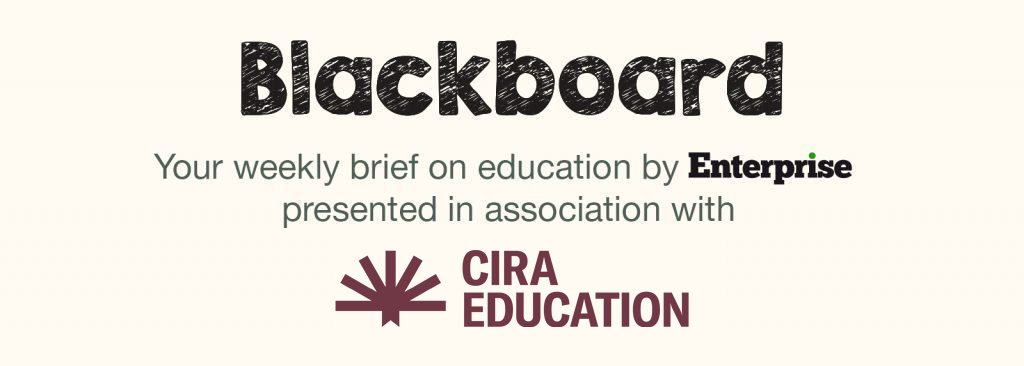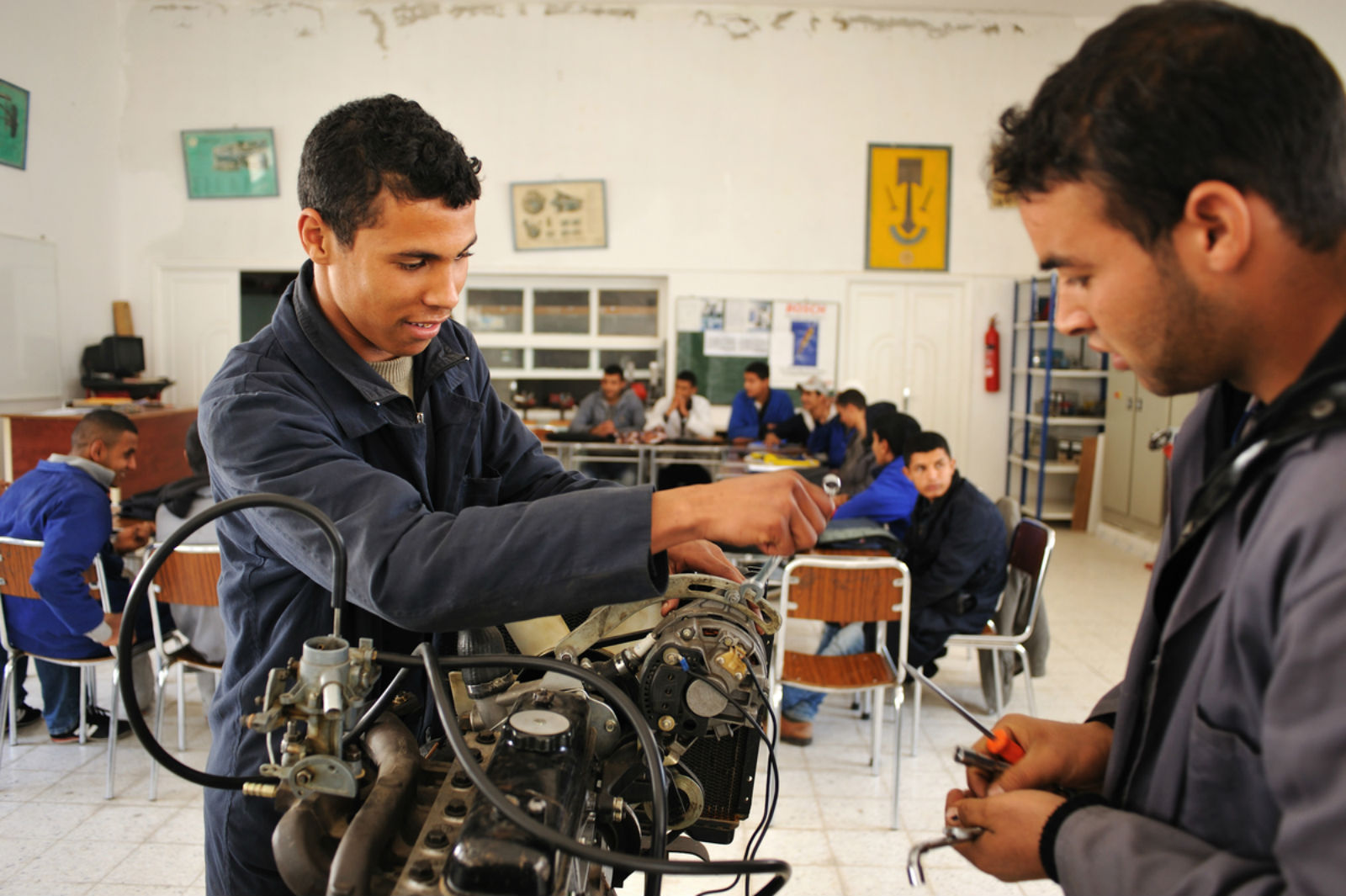- US to bail out SVB depositors, hand emergency loans to banks to avert banking crisis. (Startup Watch)
- Adviser to start work on Safi + Wataniya offerings on Wednesday. (Privatization Watch)
- Metito + BII launch investment platform to tackle water insecurity in Africa. (Investment Watch)
- Amazon to triple warehouse space in Egypt this year. (Also on our Radar)
- The signs investor are looking for — a conversation with Simon Kitchen, managing director and head of strategy at EFG Hermes Research. (Spotlight)
- A new short selling mechanism is imminent + futures exchange to launch before year-end? (Capital Markets)
- EGX suffers biggest single-day loss since January. (What We’re Tracking Today)
- Corporates in EM are having a hard time in the debt markets. (Planet Finance)
- Gov’t wants to grow Egypt’s vocational and technical schools, with the help of the private sector. (Blackboard)

Monday, 13 March 2023
AM — US to bail out SVB depositors to avert banking crisis
TL;DR
WHAT WE’RE TRACKING TODAY
THIS MORNING: EGX falls more than 3% in biggest single-day loss since January

Good morning, wonderful people. We have 10 days to go until Ramadan — are you ready?
Hang your lanterns and prep your iftar menu: Thursday, 23 March will be the first day of Ramadan, according to the National Research Institute of Astronomy and Geophysics.
EGX WATCH- Shares on the EGX saw their biggest single-day loss since January yesterday, continuing a recent run of bad form that has left it down 10% from its recent high last month. The benchmark index fell 3.1% during trading yesterday to its lowest level in five weeks, leaving it up 9.2% year-to-date.
Almost every component finished in the red: Egypt Kuwait Holding was the only EGX30 constituent to see gains yesterday, finishing the session up 0.7%. e-Finance (-7.8%), GB Auto (-7.7%), and Ezz Steel (-7.3%) posted the biggest dips.
EGP WATCH- The EGP inched closer to the 31 mark against the greenback yesterday, easing two piasters to 30.96, according to central bank figures. The currency has slipped around 1% since the beginning of March, and some analysts have predicted larger falls in the coming weeks as we continue to grapple with a shortage of foreign currency.
HAPPENING TODAY-
The Danish PM is in town: Danish Prime Minister Mette Frederiksen is in Cairo for talks with President Abdel Fattah El Sisi and Prime Minister Moustafa Madbouly, her office said in a statement yesterday. The war in Ukraine, illegal immigration, climate, and regional security will all be on the agenda, according to the statement. Frederiksen arrived in the capital yesterday and will stay until tomorrow.
As is the Italian FM: Italian Foreign Minister Antonio Tajani is heading to Egypt after visiting the West Bank and Israel, Italian news agency ANSA said last week.
El Molla speaks at BEBA: Oil Minister Tarek El Molla will be guest of honor at a dinner organized by the British Egyptian Business Association (BEBA Egypt) at Cairo Marriott Hotel.
The SCZone is in Vietnam: Representatives from the Suez Canal Economic Zone (SCZone) are in Hanoi where they will meet with local businesses and investors in a bid to attract investment. The roadshow lasts through to Friday, 17 March.
|
THE BIG STORY ABROAD-
Dominating the conversation in the global business press this morning: All you SVB customers can breathe a sigh of relief after US authorities announced they would guarantee all deposits in a bid to prevent a wider banking crisis. We have the full story in this morning’s news well, below. (AP | Reuters | Financial Times | Bloomberg | Wall Street Journal | CNBC | New York Times | Washington Post)
It’s Oscars night: It’s been a good night so far for folks behind All Quiet on the Western Front and Everything Everywhere All at Once, which between them have walked away with seven of the 15 awards announced so far. Here are the big wins so far:
- Actress in a supporting role: Jamie Lee Curtis for Everything Everywhere All at Once.
- Actor in a supporting role: Ke Huy Quan for Everything Everywhere All at Once.
- Cinematography: James Friend for All Quiet on the Western Front.
- Animated feature: Guillermo del Toro’s Pinocchio.

*** It’s Blackboard day: We have our weekly look at the business of education in Egypt, from pre-K through the highest reaches of higher ed.
In today’s issue: The Education Ministry recently launched a strategy to grow the number of vocational schools in Egypt and introduced a package of incentives and perks designed to reel in more private sector partners to develop these schools.
Somabay brings out the best in majestic natural elements where raw beauty and endless activities reign supreme. Immerse yourself into a picturesque getaway all year long. This is simply Somabay. For more information, call 16390 or visit www.somabay.com.
STARTUP WATCH
US to bail out SVB depositors, hand emergency loans to banks to avert financial crisis
US authorities have moved to guarantee all deposits held at the collapsed Silicon Valley Bank (SVB) in emergency measures aimed at preventing contagion and a wider crisis in the banking sector. Here’s what’s happening:
#1- Depositors will have access to all of their money starting Monday, the Treasury, the Federal Reserve and the Federal Deposit Ins. Corporation said in a joint statement last night. Typically, only the first USD 250k is insured under US law but authorities say they will make whole all deposits held at the bank.
#2- The Federal Reserve is providing emergency lending to US banks to “help assure banks have the ability to meet the needs of all their depositors,” it announced last night. The facility will provide loans of up to one year to lenders that pledge US treasuries, mortgage bonds and other qualifying assets.
Another bank just failed: The New York-based Signature Bank yesterday became the third-largest US bank failure on record when regulators shuttered the lender due to “systemic risk.” This came just two days after SVB’s implosion, raising fears among policymakers that the US banking system could be swiftly engulfed in crisis. Clients of Signature Bank — one of the primary banks for the crypto industry — will also have their deposits guaranteed by the government, according to the statement.
ICYMI: SVB was shut down by US regulators on Friday, becoming the second-largest bank failure in US history, following a frantic two-day bank run. The bank was one of the most popular for startups, leaving firms across the world without access to their deposits.
There are plenty of Egyptian startups affected: A list circulating among local players reportedly includes the names of 46 Egyptian startups and two VC firms (one of them global) that were banked with SVB, an industry source told us last week. Acasia Ventures Managing Partner Aly El Shalakany told us at the weekend that 2-3 of the 10 companies in Acasia’s portfolio banked with SVB, while three of the portfolio companies of EFG Hermes’ startup investment arm EFG EV Fintech have exposure, valU CEO Walid Hassouna told Al Borsa yesterday, without revealing any names.
The CBE speaks: In a statement (pdf) yesterday, the central bank confirmed that the Egyptian banking sector does not have exposure to SVB, adding that local banks have not made any investments in (or deposits with) SVB.
It doesn’t look like anyone wants SVB: An auction held by US regulators yesterday doesn’t seem to have gone well, according to the Financial Times’ sources, who say that all potential buyers had declined to bid. None of the country’s five largest banks — including JPMorgan and Bank of America — were interested, and neither were Canadian lender RBC and US bank PNC who were both invited to bid.
The markets are relieved: Risk assets rose in the wake of the announcement, with US stock futures up almost 2% and BTC climbing almost 10%. Meanwhile, US treasuries and gold both climbed. The response in Asia this morning is decidedly mixed, with shares in Japan down more than 1.5%, the Kospi treading water, and Chinese shares in the green.
The odds of a more aggressive Fed rate hike next week have declined significantly: Concerns about the impact rising interest rates are having on the banking sector will likely cause the Federal Reserve to opt for caution when it holds its policy meeting next week and raise rates by another 25 bps. A week ago, the market was pricing in a larger 50-bps hike but investors now think that the banking scare, together with softening wage growth in February, will prompt policymakers to go for a smaller rise, according to the Financial Times.
PRIVATIZATION WATCH
Safi + Wataniya prepare for offering

Safi + Wataniya to begin offering prep on Wednesday: The government will start preparing military-owned bottled drinks firm Safi and fuel retailer Wataniya for offering on Wednesday, 15 March, cabinet said yesterday. The advisor or advisors working on the sales will start outreach to strategic investors in the marketing phase of the transaction, it suggested. The statement did not name advisors or make clear whether the state had mandated separate advisors for each transaction.
That’s not all: The government will offer four “large” companies to investors through international investment banks, cabinet said. The statement didn’t disclose which companies would be offered, provide a timeframe, or name the advisors.
Size of the stake still up in the air: The government is yet to confirm how much of the Safi and Wataniya it is prepared to offer to strategic investors. That makes sense: One of the jobs of the investment bankers will be to suss-out appetite among potential investors.
Strategic investors first, public share sale second: Safi and Wataniya — both owned by the military’s National Services Projects Organization — were reported in January to have been added to the pre-IPO fund managed by the Sovereign Fund of Egypt, which has been restructuring the companies ahead of a share sale. The fund was earlier reported to have planned to sell a 20-30% stake in the companies to strategic investors before proceeding with public share sales when global market conditions have improved. Prime Minister Moustafa Madbouly recently expressed said the state prefers to sell stakes in state-owned companies to strategic investors over public share sales.
REMEMBER- Prime Minister Moustafa Madbouly last month unveiled the government’s plan to sell stakes in 32 state-owned companies through sales to strategic investors and offerings on the EGX by the end of 1Q 2024. The privatization drive comes as part of Egypt’s USD 3 bn loan program with the IMF, under which it pledged to reduce the involvement of state- and military-owned enterprises in the economy.
Time is of the essence: Pressure on the EGP is unlikely to ease until the government starts showing progress in delivering on its privatization pledges. Foreign investors are continuing to sit on the sidelines in part due to concerns about stalling privatization momentum — see United Bank and Vodafone Egypt — and pressure is now building again on local debt and the currency.
The news got international coverage: Bloomberg.
INVESTMENT WATCH
Metito + BII launch investment platform to tackle water insecurity in Africa

Metito + BII launch Africa water investment platform: Dubai-based water and wastewater treatment player Metito and the UK’s development finance institution, British International Investment (BII), yesterday launched an investment platform that will finance projects to improve water security across Africa, according to a joint statement (pdf).
A commercial model for investment in water infrastructure: The Africa Water Infrastructure Development (AWID) will target sustainable water projects at scale to address the funding gap in water security, Metito’s managing director Rami Ghandour and BII’s managing director and head of Africa Chris Chijiutomi said at the launch at the British Embassy in Cairo. The headquarters of the venture have not yet been set but AWID will initially operate from Dubai, Metito’s headquarters.
The JV has been seeded with two existing projects: The first is a desalination project in Sharm El Sheikh that since 1999 has provided 63 hotels with potable water and some wastewater management services. The second is a water treatment facility in Kigali, Rwanda, established two years ago. Future investments are already in the pipeline, Ghandour told Enterprise, without giving further details, saying that no specific timeline has been established.
AWID doesn’t have a fixed amount of capital: The financing provided by the two partners will be determined by the projects accepted, Ghandour told Enterprise, declining to disclose a specific figure. Metito and BII will split financing for AWID 60:40, with Metito contributing the majority, he added.
BII “is looking to commit anywhere between USD 1 and 2 bn across all our markets” in 2023, Chijiutomi told us. In 2021, the agency formed a similar joint venture with Dubai Ports World for projects in the African ports and logistics sector, with DP World committing some USD 1 bn and BII pledging over USD 700 mn in investments over several years.
AWID wants “bankable” and “investable” projects, Chijiutomi said. BII’s funds for AWID will either come in the form of direct investment or by mobilizing other commercial capital, he added.
BII is taking a long-term, patient approach: The high inflationary environment in Egypt poses an opportunity for BII, as a counter-cyclical investor, Chijiutomi said. The agency wants to invest long-term, patient capital, “which is what we think is required in this ecosystem” he added. Looking ahead, BII wants to explore investments in the green hydrogen and food and agriculture sectors in Egypt, as well as pharma, venture capital targeting the tech sector and SMEs.
Metito has a track record in Egypt’s water infrastructure industry: The company, alongside Hassan Allam Holding, Orascom Construction, and Arab Contractors, is developing the Al Mahsama agricultural drainage treatment plant. Focused on providing water infrastructure in emerging markets, Metito wants to take a “bold [investing] approach” that “brings in private sector capital,” Ghandour said. AWID will target Egypt as the government has positioned the water infrastructure and security as a key priority for its privatization strategy, he added.
British companies are keen on water projects in Egypt: UK company, British Water has recently signed an MoU with the Housing Development to provide smart water infrastructure to 42 new cities across Egypt, British Ambassador to Egypt Gareth Bayley added at the launch.
AMENDMENT-
This story was amended on 15 March, 2023 to update figures on the investments BII is making in its joint venture with Dubai Ports World that Enterprise has since learned were not accurate.
SPOTLIGHT
The signs investor are looking for — a conversation with Simon Kitchen, managing director and head of strategy at EFG Hermes Research

Coffee With: Simon Kitchen, managing director and head of strategy at EFG Hermes Research. Simon Kitchen (LinkedIn) leads on strategy, economics, and index-related research in the MENA region for our friends at EFG Hermes Research. He’s also responsible for the bank’s MENA top 20 portfolio. Simon joined EFG Hermes in 2007 and has more than two decades of experience as a MENA analyst and economist.
Looking ahead amid EFG Hermes’ One-on-One Conference in Dubai: We sat down with Simon on the sidelines of EFG Hermes’ flagship conference last week to talk about the challenges facing the Egyptian economy, the signs investors are looking for when it comes to the government’s privatization program, and his top picks and predictions for the wider region. Below are edited excerpts from our conversation.
ENTERPRISE: There’s plenty of talk right now about the Madbouly government’s privatization program, which is aiming to see through stake sales in some 32 state-owned companies over the next year. How do you think the privatization program is impacting foreign investors’ outlook on Egypt?
SIMON KITCHEN: From a foreign investor’s point of view, they’re waiting to see execution on these sort of asset sales, because it’s something that Egypt has talked about for a while, but investors aren’t prepared to take things on faith. They want to see things sold and for the public sector to pull back. If we were to see a couple of proper asset sales in the next three months, that would really help.
E: What do you think the long-term impacts of the privatization program could be for the Egyptian economy?
SK: One thing that’s striking when you compare Egypt to other smaller emerging markets is that you’ve still got quite a lot of the banking system in state hands. If that was to change and private sector banks dominated the banking system, that would affect the overall complexion of the economy. It should mean more credit potentially being given to private sector businesses, rather than this phenomenon of crowding out that you’ve had in the past, say, five years. That could be quite a transformation.
E: Which state asset sales do you think we’re likely to see movement on soon?
SK: Of the major state banks, the most likely to see a transaction soon would be Banque du Caire. That’s been talked about on and off for 15 years.
E: Another key pillar of the government’s economic reform program is its efforts to boost FDI and exports. What’s your assessment of the potential to really boost FDI to Egypt and exports from Egypt? Which sectors do you think are the most promising?
SK: Energy and green hydrogen are quite promising. Egypt is fortunate because of its geographical location — good sun, good wind along the Red Sea, and then the position straddling the Suez Canal means you’re able to export hydrogen either east or west. I think the renewables program — while a bit of a late starter — has been quite successful. Then you’ve got a lot of existing infrastructure, on fertilizer production for example, that can be used for hydrogen exports.
Auto is another sector that’s been talked about for a while, but it’s a bit trickier. The size of the Egyptian market makes it quite attractive for auto manufacturers to set up — they could address the local market and export to the Gulf, the Eastern Mediterranean, or to Africa. But you need to get past big macro issues, like the stability of the currency and disruptions to imports. You need to credibly get past that before you can become a big site for that sort of automotive development.
E: A majority of respondents to EFG Hermes Research’s 2023 One-on-One Live Poll in Dubai thought MSCI’s EM stock index will outperform the S&P 500 in USD terms this year. Is that a reflection of optimism that EMs are set to see better conditions and more growth potential than developed markets this year?
SK: On balance, the emerging market index will probably perform better than the US, but I wouldn't expect massive outperformance. It's a tricky one because the performance of the emerging markets index is a function of US interest rates. Part of the reason that index did really well from October last year until February this year was because people thought that the US would stop raising rates. Now they’re less sure about that because inflation's stubbornly high in the US.
When big EMs like China, Korea, and Taiwan do badly, the GCC tends to do quite well. I think that will continue this year — perhaps the GCC does a little better than EMs in general for the rest of the year. The Chinese economy is opening up this year, but it’s still got some structural issues that mean it's not going to grow really well and the growth target they've set themselves is quite low.
The big EM funds are still very underinvested in the GCC. It accounts for around 7% of their benchmark weight, and yet these funds have in aggregate maybe 2% of their money in the region. They've historically thought the GCC is not so important, that these are not real emerging markets. Something of that sentiment lingers, but when it's 7% of your index, you have to take it a bit more seriously. It's an area that they've sort of neglected in the past and now they're realizing they need to pay it a bit more attention, and that can be quite supportive.
E: Which countries and sectors are investors at the conference excited about?
Saudi Arabia is probably the most promising. You see slow progress towards the Vision 2030 goals that the Saudi government has outlined, regulatory changes that are fairly favorable, more women coming into the workforce, and net migration picking up, so that's pretty positive. Obviously the Dubai economy is booming as well, but it's harder to find ways to invest in those Dubai stories.
This time last year, people were excited about the big Saudi banks. I think now they're more excited about smaller companies — consumer companies, for example — or healthcare, or insurers. Supermarkets and food producers will also continue to do really well.
CAPITAL MARKETS
A new lending pool to resuscitate short selling?

The Financial Regulatory Authority (FRA) could within days create a central “lending pool” in cooperation with Citibank through which investors can engage in short selling, Al Borsa reports, citing FRA boss Mohamed Farid. The regulator has been discussing amendments aimed at boosting short selling with EGX representatives and clearing house Misr for Central Clearing and Depository (MCDR), according to Al Borsa.
How it would work: Investors who want to short a certain stock currently have to approach and sign contracts with the custodian and broker of that specific security. The lending pool would streamline the process, giving investors access to any of the securities licensed for short selling in one place without having to approach custodians and brokers, according to the news outlet. MCDR would manage the lending pool.
Short selling? When investors think the share price of a company is set to fall, they try to make money on that stock by shorting it. They borrow shares from a broker, sell them immediately, then later buy them back, or “close out” their position, at a (hopefully) lower price and return them, pocketing the difference minus fees. Short selling is a riskier form of investment as there’s theoretically no limit to the level of losses investors can rack up if they make a bad pick. The opposite play is known as taking a long position, where an investor buys a security with the hope that its value will rise over time and net them gains.
We knew this was coming: Authorities have in recent months been working with Citibank and other foreign investors and experts on best practices to boost short selling activity and improve clearing procedures in the country. The EGX last year increased the list of securities eligible for short selling to 66. Short selling was launched for around 30 securities on the bourse back in 2019 but has so far failed to take off.
FUTURES EXCHANGE TO LAUNCH BY 4Q 2023?
Our futures exchange is expected to launch before year end: The country’s long-anticipated futures exchange is expected to launch in 6-8 months, Farid is quoted as saying. The FRA approved the ownership structure of the exchange and any related clearing companies “months ago,” he added. EGX boss Ramy El Dokany in December said the bourse was aiming to finalize the exchange’s ownership structure in 1Q 2023.
What’s the hold up? Some technical issues around futures contracts still need to be studied and reviewed, including “determining risk ratios and volatility rates,” according to Farid. The FRA had initially hoped to launch the exchange by the end of 2022. The plan is for the exchange to initially allow traders to buy and sell index futures contracts, before launching stock futures, and stock and index options at a later date.
Ownership limits on new futures clearing companies to be scrapped: A 10% limit on the stake each investor can hold in new clearing companies that will serve the futures exchange will be scrapped under the new amendments set to land this week, Farid said. Clearing companies will need to pay in a minimum EGP 25 mn in capital to register with the regulator and have capital of around EGP 100 mn to start operations, he added.
We only know of one clearing company in the works — and there doesn’t seem to be any private-sector involvement: State-owned banks and the EGX will be allowed to own stakes in the clearing company authorities are setting up for futures trading.
Who’s involved? The regulator has allocated at least 75% of the exchange to financial institutions that meet solvency standards and / or with experience in futures contracts. The National Bank of Egypt, Banque Misr, Banque du Caire and United Bank all reportedly want a piece of the potential exchange.
Futures trading? Futures are derivative contracts where a buyer and a seller exchange an asset at a future date at a price they both agree upon in advance. Check out our explainer on all things futures here.
EARNINGS WATCH
Raya CX earnings nearly double in 2022

Raya Customer Experience’s (Raya CX) net income rose 93% y-o-y to EGP 42.2 mn in 2022, according to its latest earnings release (pdf). The company’s top line grew 54% to EGP 1.2 bn during the year. “The currency devaluation presented an upside to our topline, however, organic growth accounted for c. 65% of the achieved y-o-y growth,” the company’s new CEO Ahmed Abouelezz said in the release.
MOVES
GAFi has three new deputies

Three new appointments to GAFI: Prime Minister Moustafa Madbouly has appointed three deputies to the CEO of the General Authority for Investment and Freezones (GAFI), Hossam Haiba (LinkedIn), according to a cabinet statement.
- Ahmed Shireen Korayem (LinkedIn) takes the position of deputy for investment promotion. Korayem has held positions as the chairman of the Egyptian Cement Division, Egyptian representative of the Arab Cement Federation and as a board member of the Building Materials Chamber of the Federation of Egyptian Industries and Arab Cement Union.
- Yasser Ahmed Abbas Younis, has been appointed as the deputy for serving investors and freezones. Younis previously served as GAFI’s head of the investor services as well held positions at its Sinai unit and at the Trade Ministry.
- Dahlia El Hawary (LinkedIn) will be the deputy for institutional development and economic performance and research. An economic policy advisor, El Hawary has worked in policy reform focused on sustainable finance and development, climate finance, access to finance and financial sector development over the past thirty years.
LAST NIGHT’S TALK SHOWS
Last Night’s Talk Shows: More privatization talk + the SVB fallout

Two topics dominated the airwaves last night: The state’s privatization plans + the local angle of SVB’s collapse. The Madbouly government yesterday said it will start on Wednesday preparing to offer two military-owned companies — bottled drinks firm Safi and fuel retailer Wataniya — to strategic investors. The news got coverage from Kelma Akhira (watch, runtime: 2:35), Ala Mas’ouleety (watch, runtime: 6:02), and El Hekaya’s Amr Adib (watch, runtime: 7:38), who said that selling off stakes in state-owned companies will help bring inflows into the country and ease the hard currency shortage.
The hometown angle of the Silicon Valley Bank (SVB) collapse: It wasn’t a total loss for Egyptian startups, according to Moneyfellows founder and CEO Ahmed Wadi, who told Kelma Akhira that some Egyptian firms with deposits in SVB were able to withdraw their funds before it was too late (watch, runtime: 7:20). Egyptian companies had a combined USD 60-70 mn deposited in the bank, he said.
The Central Bank of Egypt (CBE) needs to capitalize off of SVB’s downfall, Kelma Akhira’s Lamees El Hadidi said last night (watch, runtime: 1:54). Policymakers at the central bank need to seize this chance and see how they can encourage startups to bank locally, rather than open accounts abroad, she said.
It’s not easy for startups to open up local bank accounts, Wadi said. “Most local startups, before deciding to work with SVB, tried to open up local bank accounts but the process was much harder and took much longer [than it would have if they worked with a foreign bank],” he said. Ala Mas’ouleety (watch, runtime: 10:02) and Masaa DMC (watch, runtime: 0:30) both had coverage.
We have coverage of both stories in the news well, above.
ALSO ON OUR RADAR
Amazon to triple warehouse space in Egypt this year. PLUS: Expat plans to invest USD 400 mn in local healthcare firms

ECOMMERCE-
Amazon will triple the storage capacity of its fulfillment centers nationwide to nearly 100k cubic meters in 2023, the e-commerce giant said in a statement (pdf) yesterday. The company is also investing to beef up its delivery network and partner with more delivery firms, the release reads. The Amazon network here currently includes its flagship fulfillment center in the Tenth of Ramadan and 22 delivery stations across key cities.
ICYMI- Amazon Egypt General Manager Omar Elsahy told us why he thinks tech and the digitization of local manufacturing and SMEs growth is key to boosting FDI and exports in our recent CEO poll.
INVESTMENT-
Egyptian expat to invest up to USD 400 mn in local healthcare firms: Rick Menassa (LinkedIn) — the CEO of Toronto-based firms Health Espresso & iCare Home Health — plans to invest USD 300-400 mn in the local health sector along with undisclosed investors from Saudi Arabia, Manessa told the Emigration Ministry in an interview (watch, runtime: 5:03). Further information about the potential investment wasn’t disclosed.
Attracting more FDI from expats: The interview is part of a video campaign launched by the ministry to try and encourage Egyptians abroad to invest in Egypt dubbed “Egyptian investors abroad answer: Why do we invest in Egypt?” according to a ministry statement. The government has launched several initiatives in recent months meant to drum up USDs from Egyptians abroad amid the ongoing FX shortage, including its expat car import scheme.
PLANET FINANCE
Corporates in EM are having a hard time in the debt markets

EM corporate bonds struggle on high cost of debt: Emerging-market companies have sold only USD 60 bn worth of bonds since the beginning of the year — an 18% drop from the same period last year — as higher interest rates and high-profile troubles at EM firms including India’s Adani group and Brazil’s Americanas weigh on the market for a second straight year, Bloomberg reports. The total sales figure is the lowest to start any year since 2016, when the Federal Reserve last raised interest rates, according to the news outlet.
A sudden reversal: Investors poured record sums into EM assets earlier in the year amid growing optimism that the Fed was nearing the end of its tightening cycle. Fast forward a few weeks and the picture is looking a lot different: EM USD-denominated bonds fell 2.2% in February alone, almost wiping out all 2023 gains. In comparison, US high-yield debt is up 2.2% so far this year.
Bad news for junk-rated firms: The crunch will make it particularly difficult for EM companies with lower credit ratings to access finance, analysts told Bloomberg. “You’re seeing this bifurcation in the market where the companies that want to issue can’t because it’s too expensive, and the higher-rated ones that can issue don’t want to because they can afford to.wait,” one portfolio manager said.
Aramco ups dividends after posting record earnings in 2022: Saudi Aramco reported net income of USD 161.1 bn in 2022 — up 46% y-o-y and the most since the company listed in 2019, according to a company statement (pdf). The company said it would increase its fourth-quarter dividend to USD 19.5 bn, up 4% from the previous quarter, to be paid in the first quarter of 2023. Earnings were boosted by higher oil prices that saw companies across the oil and gas sector rake in windfalls last year and up payouts to investors.
|
|
EGX30 |
15,937 |
-3.1% (YTD: +9.2%) |
|
|
USD (CBE) |
Buy 30.84 |
Sell 30.96 |
|
|
USD at CIB |
Buy 30.85 |
Sell 30.95 |
|
|
Interest rates CBE |
16.25% deposit |
17.25% lending |
|
|
Tadawul |
10,384 |
-0.8% (YTD: -0.9%) |
|
|
ADX |
9,828 |
-0.3% (YTD: -3.8%) |
|
|
DFM |
3,386 |
-0.7% (YTD: +1.5%) |
|
|
S&P 500 |
3,862 |
-1.5% (YTD: +0.6%) |
|
|
FTSE 100 |
7,748 |
-1.7% (YTD: +4.0%) |
|
|
Euro Stoxx 50 |
4,230 |
-1.3% (YTD: +11.5%) |
|
|
Brent crude |
USD 82.78 |
+1.5% |
|
|
Natural gas (Nymex) |
USD 2.43 |
-4.4% |
|
|
Gold |
USD 1,867.20 |
+1.8% |
|
|
BTC |
USD 21,442 |
+4.6% (YTD: +29.5%) |
THE CLOSING BELL-
The EGX30 fell 3.1% at yesterday’s close on turnover of EGP 1.8 bn (11% above the 90-day average). Local investors were net buyers. The index is up 9.2% YTD.
In the green: Egypt Kuwait Holding (+0.7%).
In the red: e-Finance (-7.8%), GB Auto (-7.7%) and Ezz Steel (-7.3%).


The Education Ministry is on the lookout for 400 industrial partners to expand vocational + technical schools: The Education Ministry recently launched a strategy to grow the number of vocational schools in Egypt and introduced a package of incentives and perks designed to reel in more private sector partners to develop these schools.
A lay of the land: We currently have 48 vocational schools, developed in partnership with more than 40 corporations in manufacturing, agriculture, hotels and hospitality, and retail, Deputy Education Minister for Technical Education Mohamed Megahed told Enterprise. That’s up from just 11 schools back in 2020, he said. The ministry has been working on the vocational school system since September 2018, with the goal of making it a complete educational system capable of developing technical education in Egypt to help yield graduates who are prepared for the job market.
The government is setting its ambitions higher with its plans for vocational schools: The ministry had initially been planning to set up 100 vocational schools with private sector industrial partners by 2030 at a pace of 10 schools per year, Megahed told us. That plan has now been amended to target 400 new schools, according to ministry spokesperson Shady Zalata. The ministry has not set a timeline for the new plan, Zalata told Enterprise, but noted that it’s a top priority for the ministry as the private sector is working with the government to tie these schools to the needs of the job market. The types of schools and coursework are being designed in accordance with what manufacturers need, in order to create a trained and skilled workforce.
We also want to see a greater proportion of high school graduates pursuing vocational and technical training, with the government looking to hit a target of 70%, up from 55% currently, Planning Minister Hala El Said previously said. The government is also looking to implement certain standards for vocational training, with specific metrics for each industry, while also setting up sector skill councils in select applied technology schools. The strategy also entails establishing centers of competence while growing the number of technical schools in lockstep with industrial zones.
The private sector is getting “unprecedented” support and incentives to join in on the strategy, Zalata and Megahed told us. The national higher education strategy, which the Higher Education Ministry unveiled last week, includes a pillar focused on technical and vocational schools and will focus on expanding tech colleges (of which there are currently nine in the country). The strategy will expedite the approval process for these schools and universities, along with providing fully built and prepared schools that will be handed over to private sector players to manage, according to sources from the Higher Education Ministry we spoke with. Cutting red tape was among the key demands from the private sector to make the system more appealing, our sources had previously told us.
Private sector players are on board — and see ample value in what the government is trying to do: The government’s strategy is appealing to the private sector and encourages businesses to meet their social responsibilities, Elsewedy Technical Academy Executive Director Hanan Rehany told Enterprise. There’s been a marked — and welcome — policy shift in bringing NGOs and private sector companies into the fold in the past few years, particularly as there are clear efforts to facilitate certain procedures that were previously difficult, Rehany said. Rehany also hailed the inclusion of practical coursework alongside practical lessons in vocational and technical schools’ curricula, which have raised the quality of overall education. The introduction of new specializations is also part of the government’s plans to expand vocational and technical education in line with Egypt Vision 2030, Megahed explained.
We can expect to see the private sector getting in on more of these institutions in the near future: Elsewedy Technical Academy plans to inaugurate a new applied technology school in Ain Sokhna in 2024, with the academy taking responsibility for its construction, Rehany said. The academy is also separately cooperating with the government in its plans to launch international technical schools, she said. The ministry also launched Egypt’s first applied technology and construction school last month in partnership with the Sawiris Foundation for Social Development. The school — which operates on a three-year curriculum — will provide both theoretical and practical coursework once it opens its doors to students in the 2024-2025 academic year.
Your top education stories for the week:
- CIRA Education published its first annual sustainability report, laying out the company’s use of natural resources and what it is doing to boost sustainability at its facilities and operations.
- Higher ed strategy: Government officials put forth a host of recommendations to advance higher education at the launch of the new national strategy for higher education.
CALENDAR
MARCH
March: 4Q2022 earnings season.
March: IMF to review USD 3 bn program.
March: Gov’t to launch the National Governance Index.
March: Palestine-Israel talks in Sharm El Sheikh.
Beginning of March: Rice to be added to the EMX.
12-14 March (Sunday-Tuesday): Danish Prime Minister Mette Frederiksen visits Egypt.
12-16 March (Sunday-Thursday): American University in Cairo’s annual Research and Creativity Convention, AUC New Cairo campus.
12-17 March (Sunday-Friday): SCZone roadshow in Vietnam.
13 March (Monday): BEBA Egypt hosts discussion and dinner with Oil Minister Tarek El Molla.
13 March (Monday): Italian foreign minister in Cairo.
15 March (Wednesday): Government to start prepping Safi and Wataniya for offering.
16-18 March (Thursday-Saturday): RiseUp Summit, Grand Egyptian Museum, Giza.
19 March (Sunday): House reconvenes.
19-20 March (Sunday-Monday): PPP MENA Forum, Nile Ritz-Carlton, Cairo.
21-22 March (Tuesday-Wednesday): Federal Reserve interest rate meeting.
23 March (Thursday): First day of Ramadan (TBC). Maghreb will be at 6:08pm CLT.
26 March (Sunday): Senate reconvenes.
27-29 March (Monday-Wednesday): The first meeting of the COP transitional committee, focusing on adaptation, and loss and damage.
30 March (Thursday): Central Bank of Egypt’s Monetary Policy Committee meeting.
31 March (Friday): Finance Ministry to present draft budget to House of Representative by this date.
APRIL
April: GAFI to launch the country’s first integrated electronic platform to facilitate setting up a business.
April: President Abdel Fattah El Sisi's social support measures program to be implemented.
April: SCZone roadshow in China.
1 April (Saturday): Deadline for banks to establish sustainability units.
10-16 April (Monday-Sunday): IMF / World Bank Spring Meetings, Marrakesh, Morocco.
16 April (Sunday): Coptic Easter
17 April (Monday): Sham El Nessim.
21 April (Friday): Eid El Fitr (TBC).
25 April (Tuesday): Sinai Liberation Day.
27 April (Thursday): National holiday in observance of Sinai Liberation Day (TBC).
30 April (Sunday): Tenth of Ramadan dry port tender deadline.
30 April (Sunday): Deadline for self-employed to register for e-invoicing.
30 April (Sunday): End of Mediterranean, Nile Delta oil + gas exploration tender.
Late April – 15 May: 1Q2023 earnings season.
MAY
1 May (Monday): Labor Day.
2-3 May (Tuesday-Wednesday): Federal Reserve interest rate meeting.
4 May (Thursday): National holiday in observance of Labor Day (TBC).
4 May (Thursday): IEF-IGU Ministerial Gas Forum, Cairo.
9-11 May (Tuesday-Thursday): First edition of the Arab Actuarial Conference, Cairo.
12 May (Friday): Expat car import scheme ends.
15 May (Monday): Enterprise Exports & FDI Forum, Four Seasons Hotel Cairo at Nile Plaza.
16-18 May (Tuesday-Thursday): Egypt will host its first conference on cybersecurity and defense intelligence systems (CDIS-Egypt).
18 May (Thursday): Central Bank of Egypt’s Monetary Policy Committee meeting.
20-21 May (Saturday-Sunday): eGlob Expo, St. Regis Almasa Hotel, Cairo.
22-26 May (Monday-Friday): Egypt will host the African Development Bank (AfDB) annual meetings in Sharm El Sheikh.
JUNE
7-10 (Wednesday-Saturday): The second edition of Africa Health Excon.
10 June (Saturday): Thanaweya Amma examinations begin.
12 June – 15 July (Monday-Saturday): Thanaweya Amma exams.
13-14 June (Tuesday-Wednesday): Federal Reserve interest rate meeting.
15 June (Thursday): Deadline for bids in EGPC’s mature oil fields tender.
19-21 June (Monday-Wednesday): Egypt Infrastructure and Water Expo debuts at the Egypt International Exhibition Center.
22 June (Thursday): Central Bank of Egypt’s Monetary Policy Committee meeting.
28 June-2 July (Wednesday-Sunday): Eid El Adha (TBC).
30 June (Friday): June 30 Revolution Day.
30 June (Friday): Egypt to exit Grains Trade Convention.
JULY
18 July (Tuesday): Islamic New Year.
20 July (Thursday): National holiday in observance of Islamic New Year (TBC).
23 July (Sunday): Revolution Day.
25-26 July (Tuesday-Wednesday): Federal Reserve interest rate meeting.
27 July (Thursday): National holiday in observance of Revolution Day.
Late July-14 August: 2Q2023 earnings season.
AUGUST
3 August (Thursday): Central Bank of Egypt’s Monetary Policy Committee meeting.
SEPTEMBER
September: IMF to review USD 3 bn program.
19-20 September (Tuesday-Wednesday): Federal Reserve interest rate meeting.
21 September (Thursday): Central Bank of Egypt’s Monetary Policy Committee meeting.
26 September (Tuesday): Prophet Muhammad’s birthday (TBC).
28 September (Thursday): National holiday in observance of Prophet Muhammad’s birthday (TBC).
OCTOBER
6 October (Friday): Armed Forces Day.
13 October- 20 October (Friday-Friday): The sixth edition of El Gouna Film Festival (GFF).
Late October-14 November: 3Q2023 earnings season.
31 October – 1 November (Tuesday-Wednesday): Federal Reserve interest rate meeting.
NOVEMBER
2 November (Thursday): Central Bank of Egypt’s Monetary Policy Committee meeting.
15-24 November (Wednesday-Friday): Cairo International Film Festival, Cairo.
DECEMBER
12-13 December (Tuesday-Wednesday): Federal Reserve interest rate meeting.
21 December (Thursday): Central Bank of Egypt’s Monetary Policy Committee meeting.
EVENTS WITH NO SET DATE
2023: The inauguration of the Grand Egyptian Museum.
2023: Egypt will host the Asian Infrastructure Investment Bank’s Annual Meeting of the Board of Governors in 2023.
1Q 2023: Egypt + Qatar to launch joint business forum.
1Q 2023: FRA to introduce new rules for short selling.
1Q 2023: Internal trade database to launch.
Summer 2023: EGX to launch a shariah-compliant index.
Enterprise is a daily publication of Enterprise Ventures LLC, an Egyptian limited liability company (commercial register 83594), and a subsidiary of Inktank Communications. Summaries are intended for guidance only and are provided on an as-is basis; kindly refer to the source article in its original language prior to undertaking any action. Neither Enterprise Ventures nor its staff assume any responsibility or liability for the accuracy of the information contained in this publication, whether in the form of summaries or analysis. © 2022 Enterprise Ventures LLC.
Enterprise is available without charge thanks to the generous support of HSBC Egypt (tax ID: 204-901-715), the leading corporate and retail lender in Egypt; EFG Hermes (tax ID: 200-178-385), the leading financial services corporation in frontier emerging markets; SODIC (tax ID: 212-168-002), a leading Egyptian real estate developer; SomaBay (tax ID: 204-903-300), our Red Sea holiday partner; Infinity (tax ID: 474-939-359), the ultimate way to power cities, industries, and homes directly from nature right here in Egypt; CIRA (tax ID: 200-069-608), the leading providers of K-12 and higher level education in Egypt; Orascom Construction (tax ID: 229-988-806), the leading construction and engineering company building infrastructure in Egypt and abroad; Moharram & Partners (tax ID: 616-112-459), the leading public policy and government affairs partner; Palm Hills Developments (tax ID: 432-737-014), a leading developer of commercial and residential properties; Mashreq (tax ID: 204-898-862), the MENA region’s leading homegrown personal and digital bank; Industrial Development Group (IDG) (tax ID:266-965-253), the leading builder of industrial parks in Egypt; Hassan Allam Properties (tax ID: 553-096-567), one of Egypt’s most prominent and leading builders; and Saleh, Barsoum & Abdel Aziz (tax ID: 220-002-827), the leading audit, tax and accounting firm in Egypt.







